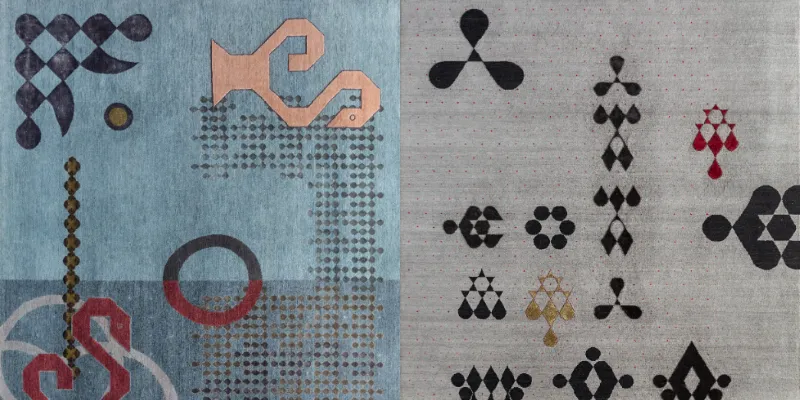This father-son duo overcame numerous obstacles to grow their carpet company and export to 60 countries
Rajasthan-based Jaipur Rugs was founded by Nand Kishore Chaudhary in 1978. The company employs more than 40,000 weavers and artisans from 600 villages across the country, and exports carpets to more than 60 countries.
In the early 70s, Nand Kishore Chaudhary’s father ran a shoe shop in Churu, a small district in Rajasthan. When Nand Kishore joined the shop after completing his graduation in 1975, the business was incurring losses. So, he decided to shut shop. He also got an opportunity to work in a bank but he refused and instead, kept scouting for bigger and better opportunities. He had a vision of running his own business someday.
Around the same time, a friend suggested he try his hand in the carpet industry, which was an upcoming sector in India in the late 70s and early 80s. Nand Kishore instantly took to the idea, and borrowed Rs 5,000 from his father to launch Jaipur Rugs in 1978.
There was no looking back after that.
Nand Kishore’s son, and second generation entrepreneur, Yogesh Chaudhary, Director of the Group, gives SMBStory a peek into how his father got his business up and running, and managed to stay relevant through the years.
Personal journey
Yogesh says that his father belonged to an extremely conservative Marwari family where “caste system was very prominent.”
The weavers of Rajasthan, on the other hand, belonged to the regar caste, considered to be untouchables. This became a cause of conflict and disharmony among his family members and extended relatives. “My father was not invited to several social gatherings and was almost ousted because he was working with the so-called untouchables,” says Yogesh.
He adds that in 1990 his father decided to temporarily shift base to Gujarat because the availability of skilled workers was more. Moreover, he realised that directly interacting with the weavers and artisans helped him eliminate the middlemen in the business, resulting in better financial outcomes.
This was a win-win for both the parties and the income of weavers grew by 50 percent, and in some cases even 200 percent. This was significant because a carpet takes between three months to a year to get made. “The artisans started working harder when they were compensated better,” Yogesh points out.
Yogesh joined the business at the age of 19 in 2006. The circumstances leading up to his entry in the company were not very rosy.
A self-confessed technology enthusiast, Yogesh was in his hometown in the year 2006. He was studying at Boston College, Massachusetts, and had come to stay with his family for a month. However, a robbery during this period and the subsequent exit of several senior people from the organisation forced Yogesh to drop out of college midway and join the business full time.
Pointing to other challenges, Yogesh talks about the 2008-2009 financial crisis. He says that the company lost around Rs 20 crore at the time, and since it was relatively smaller in size, the very “survival of the company seemed to be at stake”.
However, Jaipur Rugs has come a long way since then. Today, it employs more than 40,000 weavers and artisans from 600 villages across the country. An artisan working with Jaipur Rugs earns somewhere between Rs 8,000-Rs 12,000 per month. They are paid according to per square foot of the carpet completed.
From two looms in the initial years, the company now owns 7,000 looms, According to its financials, the company reported revenue over Rs 142 crore in FY20.

The business model
Jaipur Rugs as a company specialises in hand-tufted and hand-knotted carpets. The brand started its journey with hand-knotted carpets, and built expertise in hand-tufted carpets in the last 15 years only.
The company has also scaled and digitally transformed over the years. It has implemented ERP systems and uses computer-aided design (CAD) for designing and printing, which has reduced the load of manual work.
Jaipur Rugs also launched an app in 2018 - Tana Bana, which means ‘the warp and the weft’.
The app helps monitor the activities of weavers, including the rate at which work is getting done and the availability of raw materials and dyes. Yogesh says, “The app sends alerts to the head office in real time and helps solve problems at the grassroot level without physical intervention.”
Jaipur Rugs is mainly a B2B business but the company also launched its website in recent years.
It has its own stores in Delhi, Bombay and Jaipur. Their carpets are priced between Rs 5,000 and Rs 5 lakh.
The export-import debate
India houses numerous well-known carpet manufacturers such as Saif Carpets, YAK Carpets, and Obeetee Rugs. Infact, Indian carpet craftsmanship is popular throughout the world. Still, when it comes to numbers, there is a gap.
According to a report by Mordor Intelligence, almost 90 percent of the carpets made in India are exported. The exports stood over Rs 64,000 crore ($916.15 million) between April to November 2019.
Yogesh himself highlights that 85 percent of the company’s revenues come from international markets. Jaipur Rugs exports to over 60 countries, including the US, Japan, the Middle East, Germany, South Africa, Brazil, etc.
Giving his perspective on the import-export debate, Yogesh says, “So much business was coming from the export market that for the longest time we were busy in exporting, and had little time to look into the domestic market.”
This trend may well decrease in the future as the company plans to focus on retail.
COVID-19 and future plans
The coronavirus pandemic forced businesses throughout the world to adopt the work-from-home model. Yogesh says that the business did not face much disruption on the production side because most of the weavers and artisans were working remotely since the beginning.
The business, however, did experience a hit on the demand side. While demand coming from the European countries has slowed down, Jaipur Rugs reported a 20 percent increase in demand from the US, which is also its largest market.
Yogesh says that going forward, it is planning to open stores in Bangalore and Jaipur. This year, it will also focus on "strengthening its brand presence in the Indian market".
Edited by Anju Narayanan









